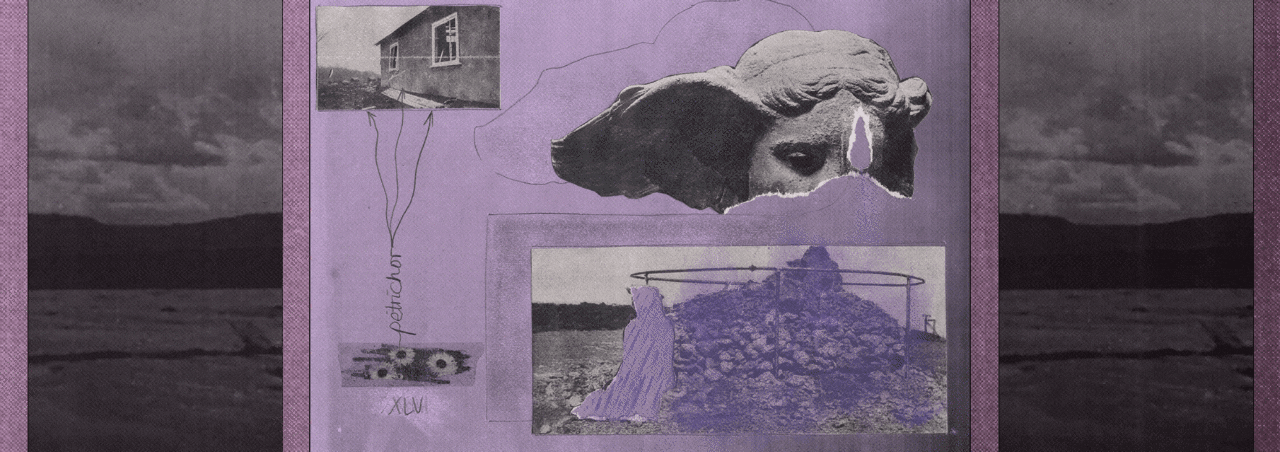Too Many Screams Unraveling the Skyways
Thunder approaches sideways. Watching the famous historian scribbling in a café I feel how difficult his angle of vision. His seersucker jacket clings like a jilted lover. I’ve just learned that a friend has starved to death. Her great bulk was deceptive. All of her organs failed, leaving only a costume of flesh.
From the rear the historian looks too steep to conquer. His impossible height has stooped over his work, but remains frightening. I’m frightened not only by his awkward posture but by the thunder crawling on all fours, dragging hundreds of carcasses.
Maybe my friend swims among those cloudy victims. Maybe her loss of focus defines her more clearly than she’s ever before been defined. The historian could research her ascent to the thunder, but he’s busy with a study of philanthropy in the late nineteenth century. He has told me how crudely the robber barons exerted their largesse. He described for me the clash of egos that spilled into a thousand rivers and polluted them. How much disease or unease can one era absorb?
Too many screams unraveling in the skyways. How can I parse them to identify my friend’s? How can an honest historian place them in a context that has no beginning or end?
The Monument
The newest skyscraper offends with its defiant geometry inscribed in brutal planes and striations. The graveyard looks up and pleads. The last tourist drops on all fours and scrabbles in the dirt. He’s eating clods, spitting out the grass and swallowing the earth. It doesn’t matter who planted this garden of graves, or why the dead lie head to feet, feet to head. Only the glistening skin of the skyscraper can repel the relevant ghosts. Only its acute and unlikely angles can situate the suffering tourist in time and space. But he refuses to look up and enjoy the spectacle of a sneer of glass slicing the pure hard rind of the moon. Such gelatinous events occur almost every night, now that the President has re-elected. Maybe when the criminal charges toughen into bedrock, when the petroglyphs become more legible, everyone will learn to more convincingly blame everyone else. The graveyard sighs a modest but apocalyptic sigh as it ingests the tourist. When he awakens at home in the next century his hands will smell of dead heroes, and his feet will have petrified to agate. Someone will say, I told you so; but the skyscraper with its awkward stance will dominate still, its windows oozing spectrums the human eye can’t process or even detect.
From the Post Office Steps
From the post office steps the world looks too small. Old ladies struggle with packages bigger than themselves. I hold the door for them, but they snarl and bare their dentures. Maybe they mean Thank You, but remain trapped in their previous lives in the wolf pack. The village crouches in sunlight the color of reprocessed wool. Last night’s rain hardly dampened the drought-hard lawns, the oily asphalt streets that intersect at deadly angles. I want to re-map this town to conform to biblical ideals, but I’m afraid that offended church steeples would duel in a clash of shingles and clang of bells. Better leave God in His Heaven, and focus on the old ladies mailing gifts to their grandchildren. I’ll pose here long enough to suggest the famous lost union soldier, the one the town put in storage because guano had pitted the bronze. In memory of memory I’ll stand here long enough to feel the distance pile up, then leave before it overwhelms me.
Café Patrons Sketched
The clash of children’s voices litters the floor. A bearded man tries to calm them, but their faces detach and knuckle like fists. Today is beach day. Their mothers hope the sharks are active and hungry, but also feel ashamed for their lack of parental love. I observe the thought balloons drifting over this little crowd. The bearded man waves goodbye. Crumbs smut his grin, but his sincerity glows a brave fluorescent orange. I nod and smile as he warns me that children can vampire every ounce of your energy. He returns to his drawing pad, on which he sketches every café patron he can catch. Now he’s drawing the children: a slew of egg-shapes sculpted in mud. I admire his skill, his quick gray perception. But I avoid his conversation, which usually critiques everything I love. Too many trees in the world, he claims, too much book learning, not enough prayer, not enough pornography. I either agree or I don’t. Too many children, he says, and thickly upholstered silence embalms him with a laugh.
William Doreski recently retired after years of teaching at Keene State College in New Hampshire. His most recent book of poetry is The Suburbs of Atlantis (AA Press, 2013). He has also published three critical studies. His essays, poetry, fiction, and reviews have appeared in many journals.
BACK
NEXT
